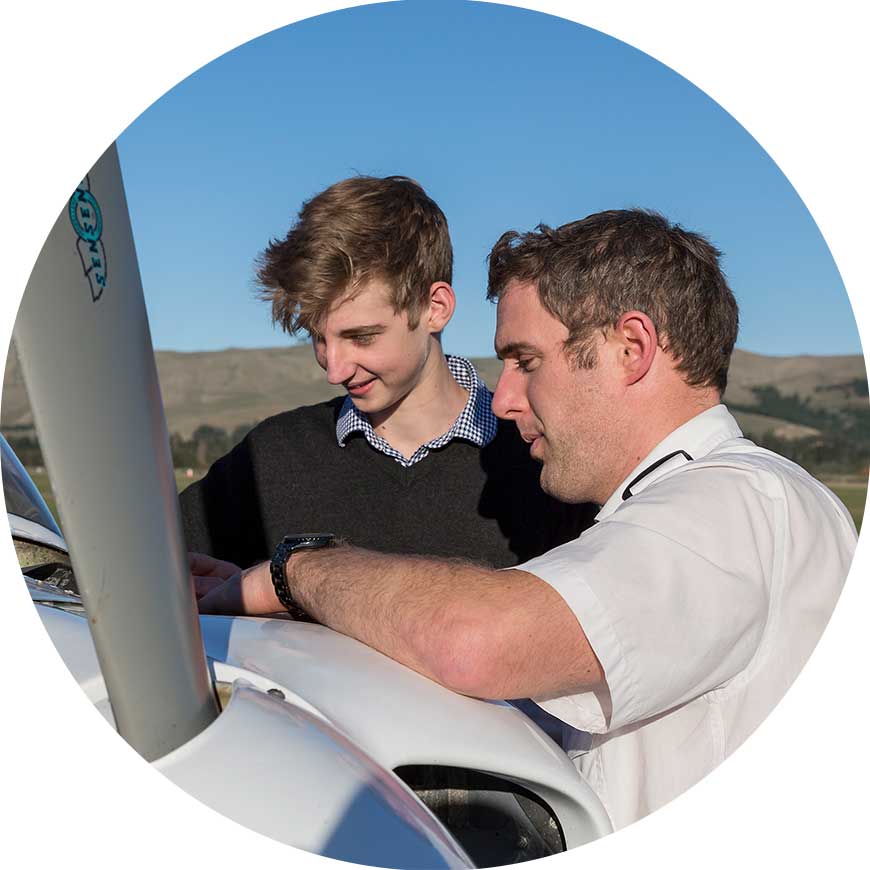COVID-19 may have hit parts of the aviation industry hard, but it’s projected to pick up strongly. The International Air Transport Association has said that air travel may recover to previous levels in under three years.
That’s not a lot of time to upskill and train people to fill the many jobs the resurgence will create, especially highly skilled and technical roles including meteorologist, aeronautical engineer, air traffic controller and flight dispatcher.
To solve the problem – and offer career opportunities for young Kiwis – ServiceIQ partnered with CBT Systems Ltd, a dedicated Theory Training Provider for New Zealand’s aviation industry. The result is a Year 13 secondary school learning option: the new Gateway Aeroscience Programme.
This new option complements the popular pilot-focused ServiceIQ Gateway Flying Programme, although hands-on control in the air can be a component of the new programme too.
CBT Systems Managing Director Martin Butler says that, because the Gateway Aeroscience Programme covers navigation and applies practical science, it’s a perfect match with the existing Year 13 science, maths and technology school curriculum.
“Many students wonder what practical purpose there is to learning maths and science. This Gateway programme demonstrates how it applies to air navigation and planning, aircraft operations, flight radiotelephony, meteorology, principles of flight and even human factors and air law.
"Some students may be focused only on pursuing a theoretical university degree. While that’s an admirable aim, they may not have considered how they could take their knowledge and passion down a different route and find something that might suit them better.”
Martin knows what he’s talking about. He is a recently retired pilot and highly-experienced Air New Zealand 737, 767, 787 and 777 Captain. Even though he has spent almost 32 years in the cockpit, he’s passionate about all the many and varied career opportunities in aviation.
“If I was young again I might still decide to train as a pilot. But today I stop and think: the work that Rocket Lab’s doing is pretty exciting; with New Zealand now controlling 5% of the world’s airspace using sophisticated systems, air traffic control is interesting; weather forecasting is a fascinating mix of art and science; and the technology involved in flight management and dispatch is state-of-the-art; there are huge developments in drones and autonomous aircraft – and some of those companies are based in New Zealand.
“There is a wider range of aeroscience opportunities in aviation than ever before. All offer fantastic roles and careers, and growth in passenger air traffic will return pretty soon so the options and opportunities will expand even more, especially for roles like pilots, where training takes five or six years.”
 Doug Pouwhare, ServiceIQ’s General Manager of Talent Supply & Transitions, notes that the skills and learning in this new Gateway programme are, as in all ServiceIQ’s Gateway programmes, transferable across roles within each service sector as well as between service and other sectors.
Doug Pouwhare, ServiceIQ’s General Manager of Talent Supply & Transitions, notes that the skills and learning in this new Gateway programme are, as in all ServiceIQ’s Gateway programmes, transferable across roles within each service sector as well as between service and other sectors.
“A good example is meteorology. It’s vital in aviation for safe operation. But much of the same knowledge is applicable in other transport operations, for tour guides operating in the wilderness, and on farms. The same applies to knowing how human factors impact on safety – that applies not just in aviation.
“I really do recommend teachers and Year 13 students, especially those with a science and technology interest, have a look at what the Gateway Aeroscience Programme offers them.
“For students in Years 11 and 12, our companion Aviation Gateway Flying Programme is the ideal option, and makes a perfect foundation for doing the Aeroscience option in Year 13. For those in Year 13 in 2021, you can add a flight component to the Aeroscience Gateway, so your options remain open and flexible.”
Doug says that both programmes are worth considering for any student with an interest in aviation, even if they don’t aspire to become an airline pilot or air traffic controller.
“Yes, there have sadly been a lot of job losses in aviation, just as in many other sectors. But there will still be an estimated 18,000 jobs in aviation in 2021. That will grow by a thousand during 2022 and then even more – to 21,000 – in 2023. There will a lot of opportunities – from airport and freight service operations to flight attending and in-flight services, not to mention all the support and service job opportunities that this growth will drive.”
Students and teachers can find out more about both Aviation Gateway programmes (and nine other popular Gateway programmes) at www.serviceiq.org.nz/schools/gateway-training